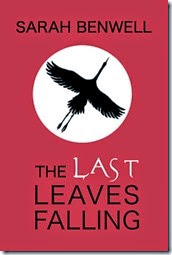I stare at the cursor blinking expectantly at the top of the page. Who do I want to be?
Published by Random House Children’s Publishing
Pages – 320
Summary
Japanese teenager, Sora, is diagnosed with ALS (Lou Gehrig's disease). Lonely and isolated, Sora turns to the ancient wisdom of the samurai for guidance and comfort. But he also finds hope in the present; through the internet he finds friends that see him, not just his illness. This is a story of friendship and acceptance, and testing strength in an uncertain future.
*****
When I was a child, I had an obsession with a certain type of film. I couldn’t get enough of those true life weepy movies often shown on TV. From ‘Who Will Love My Children’ to ‘The Boy in a Plastic Bubble’',’ I’d watch avidly, dreading the ending, knowing full well what was coming and yet compelled to keep watching. I know you are all looking at this post, thinking, Viv has lost the plot this time; what an earth has this got to do with The Last Leaves Falling? Well I haven’t lost it, because this book has a lot to do with these type of films. Basically it reminds me of films like that. This book is gently wrapped in a blanket of sadness, that you know will never turn into happiness. Right from the start, I knew this was going to create a massive weeping session, yet I was compelled to keep reading.
Not only is this book a weeper, it also has diversity ( a hot topic within YA at this moment) stamped all over it. Firstly it is set in Japan rather than the usual settings of the US or the UK. I haven’t read a Japanese book since Memoirs of a Geisha, and I’ve definitely never read a Japanese YA book, so this really was a treat.Secondly, Sora has ALS, which is often known as Lou Gehrig's disease, (named after the famous baseball player) leaving him in a wheelchair. ALS is a degenerative disease, that damages the motor neurones which send messages to the muscles in the rest of the body. When they stop receiving messages, the muscles shrink and stop working, causing paralysation in the body. This disease isn’t going to leave Sora and he is fully aware of what his destiny looks like.
This book highlights acceptance and friendship. I was so pleased to see that Sora actually made some friends who cared about him. Both lost souls in their own way, they became part of his support network, something Sora so desperately needed. This book shows that you must look for what is inside a person, rather than what is on the outside. Everyone needs love and respect, regardless of what they look like. Sora’s mother was an angel in disguise. She never ever gave up on her son; she was inspirational as she helped him to deal with the spiralling changes caused by the disease.
The big topics of this book are assisted suicide and teenage suicide pacts. This story walks a fine line between both. On one hand, you watch as Sora wanders through these suicide sites, showing people actually killing themselves. And the other you watch Sora making mature decisions about his exit from the world; aiming for peacefulness in order to save his mother from any added grief. Sora knows he is waiting to die. As the disease takes hold of his life, he simply wants to change the ending of his story. With each step he takes, you find yourself constantly wiping your eyes, as he makes decisions about his future.
I am in awe of Sarah Benwell’s writing talent. This book is beautifully written and emotionally charged. I defy anyone to read it and not be touched with emotion at the truly stunning ending. A book that deals with difficult topics that should give teenagers plenty to analyse and discuss afterwards.


Such a beautiful book.
ReplyDeleteOh man, Sora's mum gets me every time :'( :'( :'(.
ReplyDeleteHow she coped, I will never know.
Delete